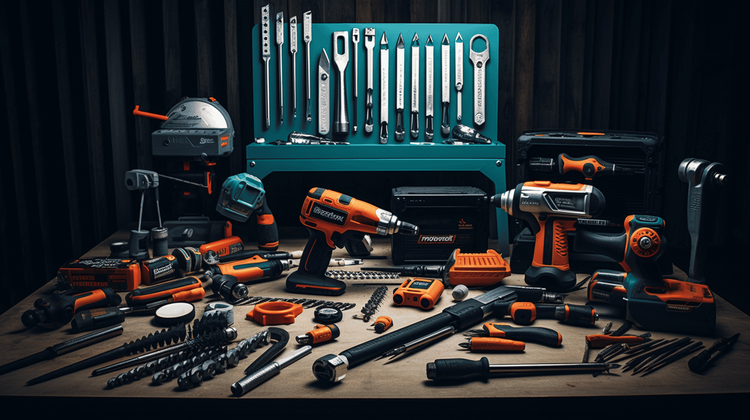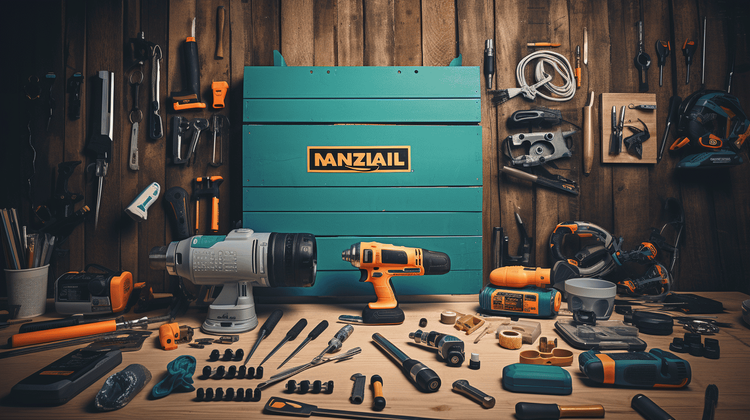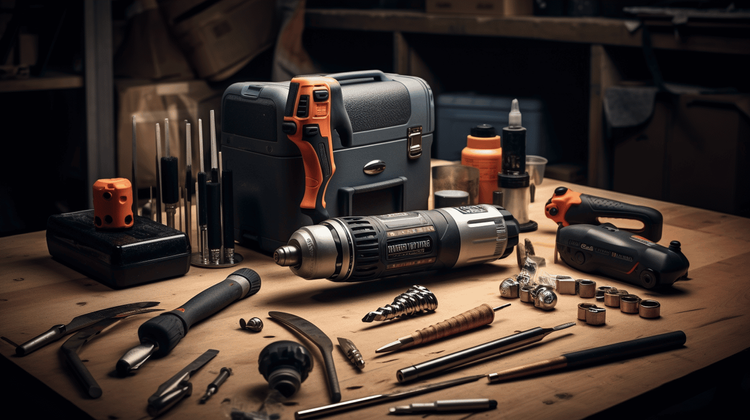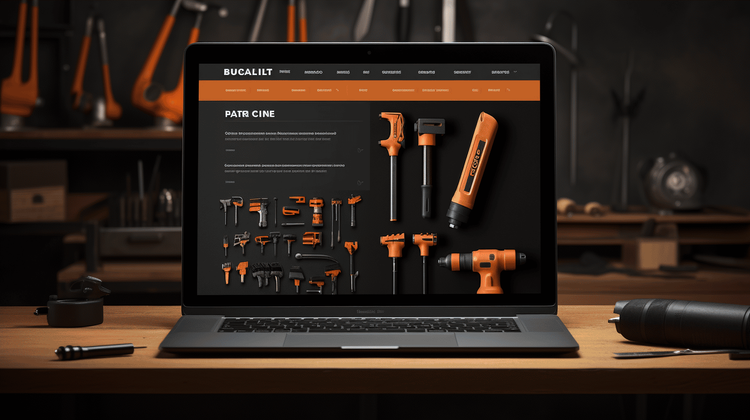Kickstart Your DIY Journey: How to Choose Affordable Tools
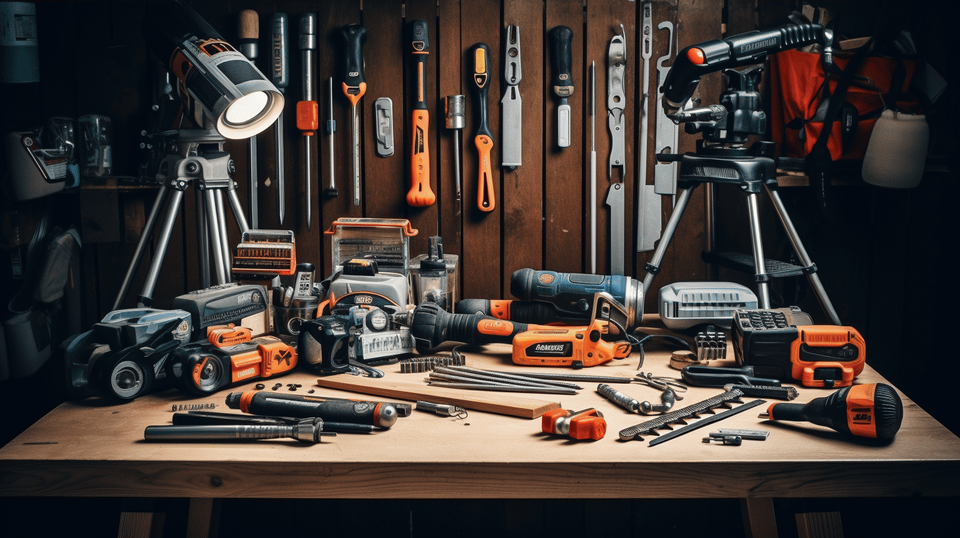
There’s no denying the wave of satisfaction that comes from doing something with your own hands. Picture this: it's Sunday afternoon, and instead of chilling on the couch, you’re in the backyard building your own patio furniture. By doing it yourself, you're not only saving money but also adding a personal touch to your surroundings. Welcome to the world of DIY (Do-It-Yourself), a trend that has revolutionized the way we perceive mundane tasks.
However, jumping headfirst into this world can be both exhilarating and slightly overwhelming, primarily because you need the right tools to get your job done. But, don't fret! This guide has got you covered. From understanding what DIY is, to choosing your essential tool kit, this article will be your compass, helping you navigate the captivating universe of DIY. So fasten your seatbelts, because we're about to embark on an informative yet exciting DIY journey! 🚀
Understanding DIY and Its Importance
Unlocking the Joy of DIY
Home improvements? Crafting your own jewelry? Building your own computer? What do all these have in common? They're all examples of Do-It-Yourself or DIY projects. You see them everywhere; blogs, television shows, and yes, probably in your neighbor's beautifully kept garden. But have you ever wondered what exactly DIY means and why it's such a big deal?
DIY, as the name implies, encourages individuals to use their creativity, skills, and hands to create or improve things themselves, rather than relying on store-bought products or professional services. By the time we're done today, you'll see that there's more to DIY than just having a fun hobby. It's actually an incredible tool for personal and financial growth! 🛠️
The Importance of DIY
The rise of the DIY culture is more than just a trendy hashtag or an opportunity to show off. It offers a multitude of benefits on several different fronts:
- Personal Development: Delving into DIY projects helps to build resilience and problem-solving skills. Each project presents its own unique set of challenges that can help enhance creativity and strategic thinking.
- Financial Savings: Why pay someone for what you can do yourself? DIY is a remarkable way to save money, especially on tasks that require simple solutions or personalized touches.
- Environmental Sustainability: DIY projects often involve recycling or repurposing materials, thus reducing waste and promoting sustainability.
- Psychological Satisfaction: There's a certain sense of accomplishment and pride that comes from creating something with your own two hands. This boosts self-confidence and provides a sense of fulfillment.
Your DIY Journey Starts Today!
Understanding the importance of DIY is one thing, but how do you get started? Like any new endeavor, the key is to start small. Choose a simple project - maybe making a photo frame or planting a small herb garden. Keep building upon your knowledge and experience from each project, and over time, you'll get the hang of it!
Remember, no one wakes up one day with the ability to build a house from scratch. It takes time, patience, and lots of practice. 😊
DIY is not just about the final product; it's about the journey and the countless moments of fun, problem-solving, and satisfaction that come along the way. So, are you ready to roll up your sleeves and embark on your DIY journey? Let's get started!
Choosing the Right Tools for Your DIY Projects
As a DIY enthusiast, you’ll appreciate the joy that comes with creating something with your own hands. However, this process becomes infinitely more enjoyable when you're using the right tools. Let's dive into some considerations to keep in mind when picking up tools that can help bring your DIY visions to life.
Understanding Your Project Needs 🧰
The first course of action when embarking on a DIY project is outlining the exact requirements of your task. Are you building a bookshelf, redecorating your room, or perhaps crafting bespoke home décor? Each project demands a distinct set of tools geared towards its unique challenges.
- A woodworking project, for instance, may necessitate a saw, a hammer, screws, and a tape measure.
- For a room redecoration, you might need a paint roller, brushes, and drop cloths.
- Crafting bespoke home décor could require any number of tools, from a hot glue gun to jewelry pliers.
Remember, possessing the right set of tools is the first stepping-stone towards precision and finesse in DIY projects.
Evaluating Quality vs. Cost 💰
So you've identified the tools you need; now comes the tricky part: determining the balance between quality and cost. While it’s tempting to snap up a cheap tool, remember the golden DIY rule — a quality tool can make the difference between an arduous process and seamless execution.
A good practice is to do a thorough comparison of differently priced tools. Assess the durability, user reviews, and functionality, rather than relying solely on price. Remember, an investment in a high-quality tool today can save you from premature replacements, enhancing your overall DIY experience in the long run.
Critical Tools Every DIY Enthusiast Needs 🔨
Even when you don’t have a specific project in mind, there are some essential tools that should be part of every DIY enthusiast's arsenal. Here are a few:
- A sturdy hammer for driving in nails, breaking things apart, and even some basic furniture making.
- A set of screwdrivers, both flat-head and Phillips, for various assembly and disassembly tasks.
- An adjustable wrench, aka the DIYer’s best friend, for handling anything that involves nuts and bolts.
- A durable tape measure to ensure accurate sizing and spacing for all your DIY ventures.
Furthermore, a solid toolbox to store all your implements is a wise investment. It keeps your tools organized, extends their lifespan, and saves you precious time on your projects.
Remember, the key to a flawless DIY project is rooted in the quality of your tools. Having the right tools, maintained to perform with precision, can not only enhance the quality of your work but also magnify the joy of creation. Now go forth, equip your toolbox wisely, and let those DIY dreams soar!
Affordable Tools for Beginner DIY Enthusiasts
Having a good grasp of the English language enhances the attainment of any DIY task fast. That's even more important when you're just embarking on your DIY journey. Sometimes, understanding the manual can turn out more challenging than the project itself. Thankfully, there are various affordable tools to make the process less daunting for beginner DIY enthusiasts.
Hand Tools
There is a myriad of hand tools out there, designed to ensure that your DIY tasks are completed seamlessly. Let's explore a few essentials:
- Screwdrivers: You'd need both flathead and Phillips screwdrivers in diverse sizes.
- Measuring Tape: This is vital for precision in your tasks.
- Claw Hammer: A tool essential for nailing and taking out nails.
- Adjustable Wrench: It provides flexibility to turn nuts and bolts of different sizes.
Now, these are just the foundations. Based on what the project is, there might be other specialized hand tools needed, but this initial selection is a great starting point!
Power Tools
For those bigger projects, some power tools might come in handy. They provide more force and precision that one can exert manually. Consider the following basics:
- Cordless Drill: This gives you the freedom to move around without wiring restrictions.
- Circular Saw: It's necessary for any task that involves cutting.
- Power Sander: It's beneficial for smoothening rough surfaces.
Remember, while power tools can be a significant time-saver, they require knowledge and caution during use. Take out some time to understand how they work before diving in!
Safety Tools
Before you begin any DIY project, safety should be your priority 💪. Some necessary safety tools to have include:
- Safety Glasses: These protect your eyes from any stray particles or materials.
- Work Gloves: These provide protection for your hands during work.
- Dust Mask: It keeps you from inhaling possibly harmful dust or chemical particles.
And there you have it, folks! You now know the basics of the necessary affordable tools for beginner DIY enthusiasts. Whether it's a minor house repair job or a backyard project, these tools will help you get your DIY done flawlessly. More so, safety tools remind us that, while DIY may be fun, it's important to stay safe while at it. Keep them at the top of your shopping list, even before the actual tools. After all, your health and well-being are priceless!
Tips for Purchasing Affordable Tools
Starting a new project can be thrilling, but the cost of buying new tools can often throw a wrench in the excitement. If that sounds like a familiar problem, don't worry! There are numerous strategies to buy tools at a fraction of brand-new prices. This might involve keeping an eye out for sales, considering pre-owned tools, or weighing the pros and cons of online vs. in-store shopping. This article will delve into these strategies to ensure you're armed with the best money-saving tactics next time you're in the market for tools.
Harnessing the Power of Sales and Discounts 🏷️
Who doesn't love a good bargain? Sales and discounts can significantly cut down the costs of your tools, making it a strategy worth considering. Here's how you can make the most of them:
- Calendar your Sales: Many stores launch their sales during certain times of the year like Black Friday, Boxing Day, or during change of seasons. Mark these dates on your calendar so you don't miss out.
- Subscribe for Alerts: Most hardware stores have newsletters or apps that alert you when discounts are available. For some, you can customize these alerts for specific items or categories, ensuring you're prompted for tools sales.
- Price Protection Policies: Some stores offer a price protection policy where they refund the difference if their item goes on sale shortly after you purchased it. Keep a lookout for such policies!
Saving Tip: Some stores even offer discounts if you trade in your old tools!
Exploring Pre-owned Tools 🔎
If you're not picky about brand new products, pre-owned or second-hand tools might be an excellent option for you. Many of these tools are in good working condition and are sold at a fraction of their original price. However, be wary of overused or damaged ones. Some tips while exploring pre-owned tools include:
- Check the Tool's Condition: Look for signs of excessive wear or damage. If it's an electric tool, ensure it works properly before purchasing.
- Research the Market Value: Check how much the tool in question costs new to ensure you're getting a fair deal.
- Examine Return Policies: Especially when buying online, ascertain that you can return the tool in case it doesn't meet your expectations.
Online vs. In-Store Shopping 💻 vs. 🏪
In the digital era, it's realistic to wonder if it’s better to buy tools online or in a physical store. Both have their own merits; online shopping often offers better discounts and a wider variety, while in-store purchases let you physically examine the product and potentially bring it home instantly.
- Online Shopping: Many online platforms like Amazon, eBay, and others offer tools at competitive prices. Look for sales, use price comparison tools, and read product reviews before making a purchase.
- In-store Shopping: Visit several stores before making a decision. This allows you to compare prices, assess product quality, and consult professionals for advice.
In the quest to save money on tools, remember that the cheapest option isn’t always the best. Sometimes paying a little extra for a more durable or effective tool is a smarter long-term investment. And lastly, don’t forget to consider sustainable options, like borrowing tools from someone else for a one-time project. Happy shopping!
Maintaining Your Tools to Extend Their Life
Taking good care of your tools isn't just about keeping your garage or workshop tidy - it's about saving money and ensuring the longevity of your investments. Tools are an investment, it's as simple as that. If treated properly, high-quality tools can serve you for years, even generations. Whether you're a professional handyman, a woodworking enthusiast, or just someone who likes to fix things around the house, knowing how to maintain your tools can make a significant difference. So, how do you keep them in prime condition? Read on for practical steps you can follow.
Proper Storage 🔒
First things first, your tools need a good home. Proper storage is the first step in maintaining your tools:
- Avoid damp places: Moisture is a tool's worst enemy. Always store your tools in a dry, well-ventilated space.
- Use protective casings: While not necessary for all tools, it might be worth investing in protective cases for delicate or sharp-edged gadgets.
- Order and arrangement: Larger tools should always have their place on the bottom, while smaller ones can be stowed away in drawers or toolboxes.
Believe it or not, taking time to properly store your tools can save you from costly replacements later.
Regular Cleaning 🧽
Just like your car or your kitchen, your tools also need regular cleaning. Here are some guidelines to follow:
- Wipe them off: After each use, wipe your tools to remove any dust or debris. You can use a damp cloth, but make sure to dry them off properly. You don’t want rust forming on your tools because of the leftover moisture!
- Deep cleaning: Depending on how often you use your tools, consider a deep clean every few months. This could involve disassembling your power tools and giving them a thorough clean.
Remember, a clean tool is a happy tool!
Periodic Check-Up 👩🔧
Routinely giving your tools a check-up can prevent minor issues from transforming into big problems. Look for signs of wear and tear, such as chips or cracks. If a tool is faulty, decide whether it needs a repair or a replacement. Predictive maintenance is always better than reactive repair!
In the end, just remember: your tools need TLC too! Treat them with care, and they'll serve you well in return. So, why not start today? Grab your favorite screwdriver or hammer and give it some much-needed care. Your tools (and your wallet) will thank you!
Conclusion
And there you have it, a handy guide on kick-starting your DIY journey with affordable tools!
Acquiring the necessary tools for your DIY projects doesn't have to mean spending a fortune. With the right approach, understanding your needs, evaluating cost versus quality, and taking advantage of sales and discounts, you can set up your DIY toolkit without breaking the bank.
Let's not forget the fact that a tool's life can be significantly extended through proper storage, regular cleaning, and periodic checkups. These practices not only preserve your tools but also contribute to your safety while working on projects.
Being a DIY enthusiast is about applying your creativity and skills to build or repair things. It's about the pride of accomplishment that comes from making something with your own two hands. And with Ultra Handy, we're here to support and enrich your DIY journey, offering you a range of products, like our best-selling Bit Holder Keychain, that enhance your DIY experience by helping you stay organized and efficient.
Remember, the DIY-er's motto: Work smart, not hard. And that begins with equipping yourself with the right, affordable tools. Take that first step on your DIY journey today by visiting our site here. Happy DIY-ing! 👍🔧
Frequently Asked Questions
- What are some factors to consider when choosing affordable tools for DIY projects?When choosing affordable tools for DIY projects, consider factors such as quality, durability, functionality, brand reputation, user reviews, and the specific requirements of your project.
- Are cheap tools of good quality?Not all cheap tools are of good quality. While some inexpensive tools can offer decent quality, it's important to research and read reviews to ensure that the tools you choose will perform well and last long enough to complete your DIY projects successfully.
- Is it better to invest in a few expensive tools or have a wide range of affordable tools?It depends on your specific DIY needs and budget. If you frequently undertake projects that require specialized tools, it may be worth investing in a few high-quality tools. However, if you have a wide range of projects and limited funds, it's often more practical to have a collection of affordable tools that cover basic requirements.
- Where can I find affordable tools for my DIY projects?You can find affordable tools for your DIY projects at various places, such as online marketplaces like Amazon and eBay, local hardware stores, garage sales, thrift stores, and even online DIY communities where people sell or give away unused tools.
- How do I maintain and prolong the lifespan of affordable tools?To maintain and prolong the lifespan of your affordable tools, clean them regularly after use, store them properly in a dry and organized space, avoid overload or misuse, follow the manufacturer's instructions for maintenance, and consider investing in protective cases or covers for delicate tools.
